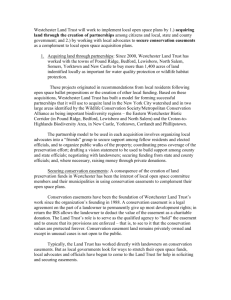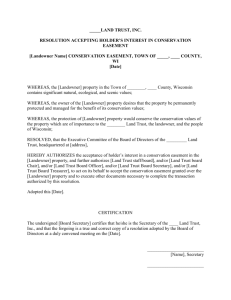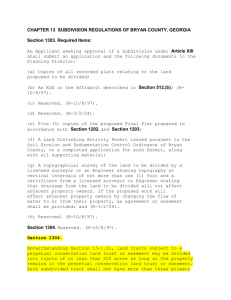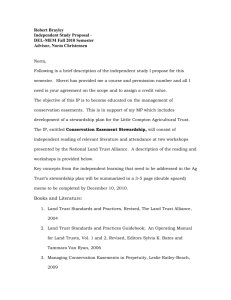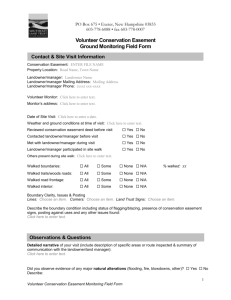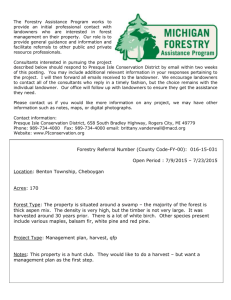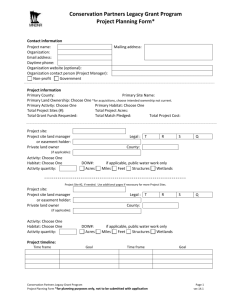Appendix D-J - The Green Valley Institute
advertisement
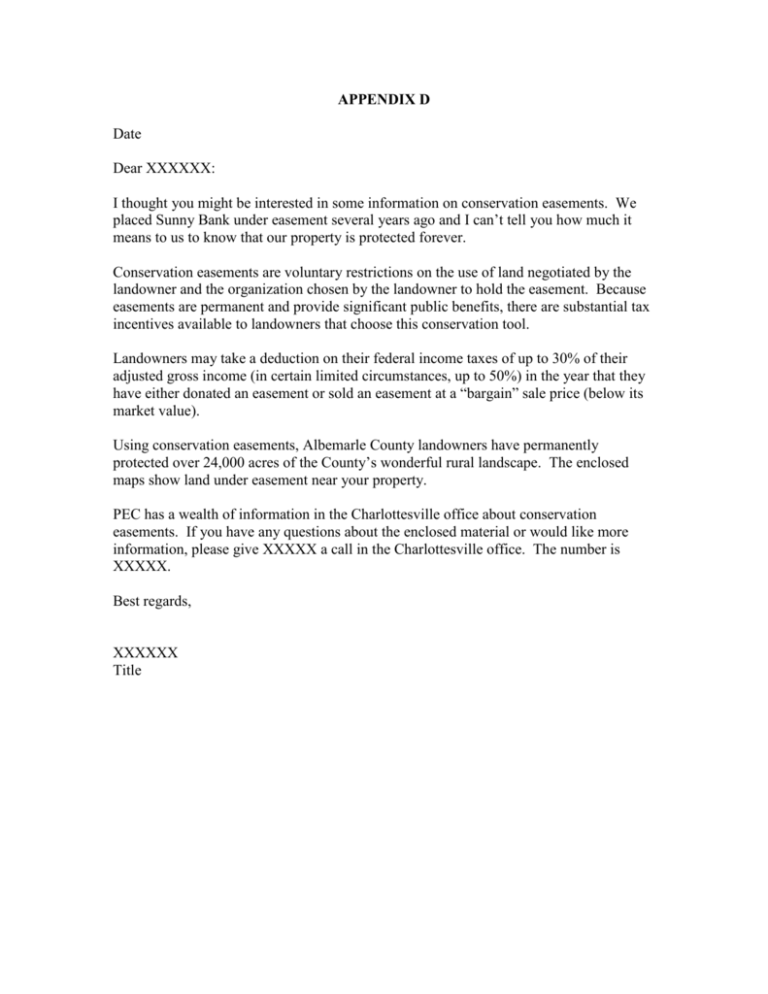
APPENDIX D Date Dear XXXXXX: I thought you might be interested in some information on conservation easements. We placed Sunny Bank under easement several years ago and I can’t tell you how much it means to us to know that our property is protected forever. Conservation easements are voluntary restrictions on the use of land negotiated by the landowner and the organization chosen by the landowner to hold the easement. Because easements are permanent and provide significant public benefits, there are substantial tax incentives available to landowners that choose this conservation tool. Landowners may take a deduction on their federal income taxes of up to 30% of their adjusted gross income (in certain limited circumstances, up to 50%) in the year that they have either donated an easement or sold an easement at a “bargain” sale price (below its market value). Using conservation easements, Albemarle County landowners have permanently protected over 24,000 acres of the County’s wonderful rural landscape. The enclosed maps show land under easement near your property. PEC has a wealth of information in the Charlottesville office about conservation easements. If you have any questions about the enclosed material or would like more information, please give XXXXX a call in the Charlottesville office. The number is XXXXX. Best regards, XXXXXX Title APPENDIX E Date Mr. and Mrs. Landowner Address Dear Mr. and Mrs. Landowners: XXXX and XXXX asked me to send you some information on conservation easements. Over 150 landowners in Albemarle County have used this tool to protect their property, conserving over 33,000 acres of private land in the process. The attached map shows in green the property near Covesville protected under permanent conservation easement. As you can see, Covesville is fast becoming one of the most protected areas in Albemarle County. Conservation easements are voluntary restrictions on the use of land negotiated by the landowner and the organization chosen by the landowner to hold the easement. Because easements are permanent and provide significant public benefits, there are substantial tax incentives available to landowners that choose this conservation tool. Landowners may take a deduction on their federal income taxes of up to 30% of their adjusted gross income (in certain limited circumstances, up to 50%) in the year that they have either donated an easement or sold an easement at a “bargain” sale price (below its market value). While we strive to provide accurate information, please be aware that we are not in the business of rendering legal, accounting or other professional services. Please share this information with your tax advisor to see how conservation easements may help you save your land and money. Enclosed please find a sample easement used by the Virginia Outdoors Foundation (VOF), the agency that holds most of the easements in Albemarle County. I also included a copy of the VOF’s guidelines. Also enclosed is a checklist describing the steps involved in donating a conservation easement. I’ve also enclosed lists of appraisers and attorneys that have assisted clients with easements in this area. Although the process is neither complicated nor time consuming, special situations may arise where our experience can be helpful. If you have any questions along the way, please give me a call at XXXXXX or email me at YYYYYY. Sincerely Name Title APPENDIX F Date Name Address Dear Mr. and Mrs. Landowner: The village of Granite is one of the most scenic rural villages in Baltimore County and all of Maryland. Surrounded by views of open farmland, rolling hills, and the scenic Patapsco River, Granite remains largely as it was when the village was settled as a prosperous quarry town almost two centuries ago. It is hard to believe that this pristine and historic rural area is quickly being surrounded by development encroaching from the growing Baltimore-Washington metropolitan area. The Maryland Environmental Trust and its Rural Historic Village Protection Program are working to protect the prime agricultural land and open space buffering historic villages in Maryland. As part of this conservation effort, I am contacting landowners around the village of Granite to introduce them to the Trust’s conservation easement program and other voluntary land protection options. I thought you might be interested in learning about the potential tax benefits of voluntarily protecting your property, while retaining ownership of the land. As an introduction, the Maryland Environmental Trust is a statewide land conservation organization working with citizens to preserve farmland, forest land, endangered species habitat, significant ecosystems, historic properties and other important resources. The Trust’s primary land conservation technique is the conservation easement. Since t1972, the Trust has accepted 349 conservation easements and protected more than 53,000 acres of open space. The Rural Historic Village Protection Program works with the Trust’s conservation easement program and public agricultural land preservation programs to help rural communities like Granite protect their surrounding farmland and open space. Since 1988, the Rural Village Program has worked with citizens around twelve Maryland villages and has helped landowners voluntarily conserve 3,610 acres of rural land. Conservation easements allow landowners to voluntarily donate their development rights to the Maryland Environmental Trust in return for permanent protection of the property along with significant potential tax benefits. Easements combine flexible resource protection with the potential for substantial income, estate, and property tax benefits, while at the same time reserving for the landowner all rights of ownership, occupancy and privacy. These benefits are outlined on the enclosed information sheet. I have enclosed materials describing the Maryland Environmental Trust, the Rural Village Program, and the voluntary options available for conserving farmland and open space in Baltimore County. A detailed comparison of the four conservation programs is well presented in the pamphlet. Regarding your property near Granite, please consider whether a conservation easement would fit in your intended plans. The easement would provide important protection for your family’s property and the surroundings of Granite. I will give you a call in the next two weeks to hear your thoughts and to answer any questions you may have about conserving your property or the Trust’s efforts around Granite. I will be happy to provide any additional information or meet with you to discuss options for voluntarily conserving your land. I look forward to talking with you. Sincerely yours, Name Title Enclosures APPENDIX G May 15, 2003 Name Address City, State, Zip Dear Mr. and Mrs. Name: Have you heard that the Lower Marks Creek Area was named a “Last Chance Landscape” by Scenic America for 2002-03? You may not have heard that but you are fully aware that Wake and Johnston counties are two of the fastest growing in the state. Increasing development pressures and affordable land prices are driving people away from the cities and into the rural areas of these counties. Hi, my name is name, name and I work at Triangle Land Conservancy – TLC as we like to refer to it – a non-profit land trust founded in 1983 to create a network of open space and natural areas in the six-county Triangle Region. TLC works with landowners on a voluntary basis to protect open space, farmland, natural areas, forestland, and riparian areas. As of December, 2002, TLC has protected over 4,200 acres in Chatham, Durham, Johnston, Lee, Orange and Wake Counties. TLC has named the Marks Creek area as one of the Five Priority Areas meaning that it is one of the five areas around the Triangle where we are focusing our land protection efforts. Our goals is to protect the water quality, natural areas, and scenic, rural, historic character of Shotwell and the surrounding area in Wake and Johnston counties for the greatest benefit of the community, while meeting individual landowners’ goals. You may be asking why TLC has contacted you? There is an educational workshop at NC State University on Friday, June 6 focused on Land Preservation Techniques and I would like to invite you to attend it for free. It is a great opportunity to discover more options of what landowners can do with their land. Please let us know if you will be able to attend or not by filling out the enclosed response card and dropping it in the mail. Thank you for your time. Respectfully, Name Title APPENDIX H Date Name Address Dear XXXX: Mayor Lib Tolbert and I invite you to an informal meeting on April 3rd to learn more about the benefits of voluntarily conserving property - like yours – outside Barnesville. The meeting will cover the significant potential tax benefits of conserving family land as well as voluntary programs available in Montgomery County for conserving farmland and open space. Todd Wilson of Montgomery County’s Agricultural Land Preservation Program will be available to talk about the county’s programs. The XXXXX family, who recently donated an easement on their property in Boyds to the Maryland Environmental Trust, will be on hand to talk about their decision to conserve their family’s land. I will also be available to answer questions about the Maryland Environmental Trust’s conservation easement program. There will be refreshments and time for socializing after the meeting. Todd and I will both be available then to talk individually with interested landowners about ways to conserve their properties. The meeting will be at Mayor Tolbert’s home at 7:30 P.M. If you cannot attend the meeting and would like to learn more about options for conserving your family’s property, I would be happy to come meet with you. Please call me if you would like to set up a meeting. We look forward to seeing you on April 3rd. Sincerely yours, Name Title APPENDIX I Date Name Address Dear Mr. and Mrs. Landowner: It is hard to believe that since we first wrote to you a month ago, most of the leaves have fallen, the migratory Canada geese have arrived, and the first snow flurries have been spotted. Before winter truly takes hold and the holiday season begins, we would like to invite you to an informal open house to talk about the Maryland Environmental trust and the Lower Shore Land Trust’ effort to help area landowners protect land around Tyaskin and to answer any questions you might have about ways to participate in this effort. We will also be happy to talk with you individually about options for and the potential financial benefits of conserving your property around Tyaskin. The open house will be on Thursday, November 30th at 6:00 P.M. at the community Center in Bivalve. We will have refreshments and lots of time for discussion and questions. We look forward to seeing you at the meeting. Best wishes to you and your family for a happy holiday season. Sincerely yours, Name Title APPENDIX J May 30, 2003 Name Address City, State, Zip Dear Mr. and Mrs. Name: Mark your calendars for Monday, June 23 to come out, eat some good food, at Palomino’s Restaurant, with some good people, your Deep River neighbors, and learn a little, too. Hi, my name is Name, Name and I work at Triangle Land Conservancy (TLC), a nonprofit land trust founded in 1983 to create a network of open space and natural areas in the six-county Triangle Region. TLC works with landowners on a voluntary basis to protect open space, farmland, natural areas, forestland, and riparian areas. Over the last 20 years, TLC has completed 60 protection projects totaling over 4,500 acres in Chatham, Durham, Johnston, Lee, Orange and Wake counties. TLC has named the Deep River as one of our Five Priority Areas meaning that it is one of five areas around the Triangle where we are focusing our land protection efforts. Our goal is to protect and enhance the Deep River for its significance as a drinking water supply; as aquatic and terrestrial habitat for rare species, for its timber, agricultural and recreational resources; for its historical legacy; and as a beautiful, scenic place for the highest economic and social benefit of the community. TLC also has a stake in the land because we are landowners in both Lee and Chatham counties. Our most recent endeavor in Lee County was Endor Iron Furnace, 426 acres running along 3.5 miles of the Deep River. Many consider it the most historic site in the county. One day it will serve as an historical, regional park. TLC helped to purchase the property in partnership with Lee County, the Railroad House Association, and the State of North Caroline. We will also be intimately involved in developing a management plan for the property. TLC is holding two informational meetings, on June 23 and September 11, aimed at informing Deep River landowners, like you, about: • Land preservation techniques • Reducing your inheritance and estate taxes • Keeping your land in your family They both will be dinner meetings, so come hungry! Virginia Hester, a local landowner who worked with TLC to preserve 308 acres of her 636 acre Chatham County farm will speak for herself and her experience with TLC. TLC staff, including a forester, will talk about the organization and land conservation techniques that are currently available to landowners. Please let us know if you will be able to attend by filling out the enclosed response card and dropping it in the mail by June 18. Thank you for your time. Respectfully, Name, Name
